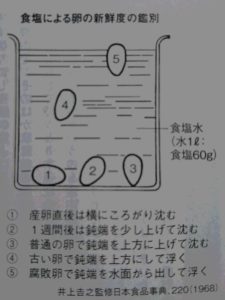A lesser-known way to determine the freshness of an egg is whether it floats in salt water.
Since eggs are living things, the condition of freshly laid eggs differs from that of older eggs. The egg white, which was stiff when fresh, gradually softens and becomes more fluid, and when boiled, the egg yolks become one-sided. Cracking the egg on a flat plate will reduce the swelling of the yolk and increase the spread. Some of the water evaporates, and over time, the carbon dioxide produced by respiration gathers at the rounded end of the egg, called the temperament, to lighten the specific gravity.
If you dissolve 60 g of salt in 1 liter of water to make a salt solution with a specific gravity of about 1.027, new eggs (specific gravity 1.08 to 1.09) will sink and old eggs (specific gravity below 1.02) will float.
In addition to this, eggs can be identified by judging that they are new if they are bright in the light, if the shell has a lot of rough texture, or if the yolk is protruding when broken.
